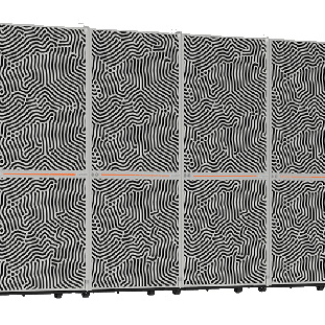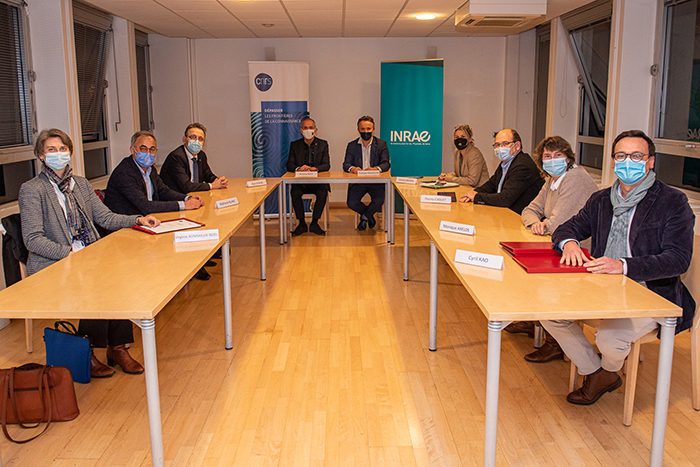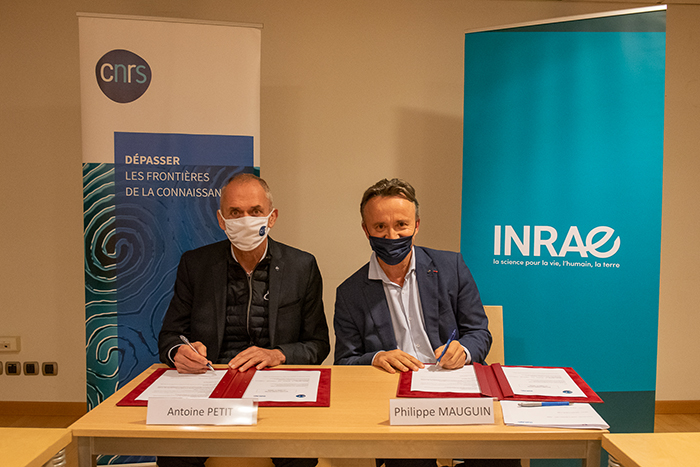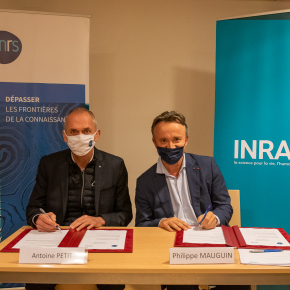
CNRS and INRAE strengthen their scientific cooperation to achieve the Sustainable Development Goals
Antoine Petit, CNRS Chair & CEO, and Philippe Mauguin, INRAE Chair & CEO, recently signed a new five-year framework agreement to underline their research institutions' commitment to working even more closely together. In line with recent developments in the French higher education and research system1 , this new agreement is fully coherent with the two institutions' scientific and innovation strategies2 , at the national level, especially through site policies, and at the international level. Natural long-standing partners, the two institutions have, in this way, committed to heightening the joint production and promotion of high-level scientific knowledge to help achieve the United Nations' Sustainable Development Goals (SDG). Given ever-increasing expectations for research, INRAE and the CNRS are working to provide solutions, based on the highest quality research, to climate, health and environmental challenges.
Long-established partners, the CNRS and INRAE want to renew the scope and terms of their collaborative efforts by highlighting their shared goal to produce the highest level knowledge possible to respond to the urgent nature of research challenges. This framework agreement is rooted in a strategic vision of ambitious shared frontier research, a few weeks after the announcement that the CNRS and INRAE would jointly steer two ambitious French Investments for the Future programmes in the areas of carbon neutrality and water resources3 .
Rapidly expanding scientific collaboration on topics involving priority issues
Collaborating within more than 40 research units throughout the country, INRAE and the CNRS have seen their shared scientific production increase by 45% over a five-year period4 . The CNRS is, then, INRAE's main academic partner and primary co-publisher.
Above and beyond their shared research units and facilities, the two research institutions are jointly involved, along with other organisations, in France's national plan as part of research alliances5 , through theme-based research structures, or even at the regional level as part of site strategies developed with higher education or training institutions. At the European and international levels, the CNRS and INRAE's shared work is carried out as part of multilateral agreements, international projects or construction of research infrastructure.
They now want to step up strategic coordination of their research policies and combine their disciplinary and multidisciplinary research efforts in the areas of life and universe sciences, the environment, human and social sciences, and engineering, mathematics, computer and chemical sciences. In particular these shared areas of responsibility should help provide responses to the issues of society covered by the UN 2030 SDGs:
- Climate change adaptation and mitigation
- Protecting and restoring biodiversity and soils
- Protecting water resources
- Public and environmental health
- Circular bioeconomy
- Managing multiple risks (natural, economic and social, etc.)
- Land use and the agroecological transition.
A closer look at their multi-scale cooperation and innovation arrangements
With more than 40,000 scientists from every field, INRAE and the CNRS are committed to using their jointly produced knowledge for innovation, training, expertise and public policy support purposes.
This strengthened cooperation will notably cover:
- Scientific co-management of the Priority Research Programmes and Equipment assigned to them by the DGRI and SGPI6 as part of France's Recovery Plan and the 4th Investments for the Future Programme,
- Support for joint actions designed to unite French research around the SDGs, in particular the issue of its environmental impact, such as GdR Labos1.57 ,
- Development of joint interdisciplinary incentive actions by the Cross-sectoral and Interdisciplinary Initiatives Taskforce (MITI) for the CNRS and Metaprogrammes for INRAE, notably in the following areas: characterising and managing natural resources and ecosystems; understanding, protecting and restoring biodiversity; dietary changes; human, animal and plant biology and health; predictive approaches in biology and ecology; biotechnologies and bioproduction, green chemistry; bioeconomy, robotics and digital technologies; public policy and actions,
- Sharing overseas representation offices, as well as developing and implementing concerted international cooperative efforts and structural facilities such as international research labs,
- Promoting joint efforts in collaboration with social and economic partners.


- 3Success of two Priority Research Programmes and Equipment (PEPR) in autumn 2021 as part of Investments for the Future Programme 4: FairCarboN, Carbon in continental ecosystems : drivers and pathways for carbon neutrality, jointly steered by the CNRS and INRAE, and OneWater, jointly steered by the CNRS, INRAE and BRGM (French geological and mining research office).
- 4The number of joint CNRS-INRAE publications went from 1102 in 2015 to 1595 in 2019.
- 5AllEnvi, AVIESAN, Ancre and Athena
- 6DGRI: Department of Research and Innovation at the French Ministry of Higher Education and Research – SGPI: Secretariat for Investment, under the authority of the Prime Minister.
- 7GdR Labos (Lab Research Cluster) 1.5 supported by the CNRS, INRAE and ADEME was established in June 2021.


